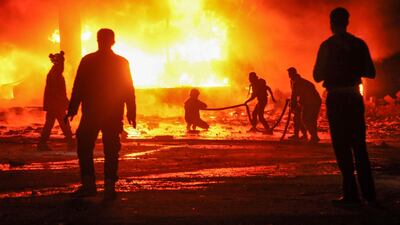The military defeat of ISIL and the creation of de-escalation zones have bred the myth that the war in Syria is over. The truth, as the events of the past week remind us, is that the conflict has graduated to a savage new phase in which outside powers and the Syrian regime are competing for fragments of the shattered country. Syria's skies are congested with combat aircraft. Its landscape is disfigured by unceasing bombing. And, nearly seven years after the civil war began, the country at large remains a battleground on multiple fronts.
At least 8,000 Syrians have fled their homes each day over the past year, joining the millions who are either internally displaced or survive as refugees abroad. They are, by the perverse standards of the Syrian conflict, the fortunate ones. Less fortunate are the civilians who have been bombed or gassed to death by the regime and its allies. Syrians have endured a week of hell as the regime renewed its bombardment of Idlib in northern Syria and the Eastern Ghouta suburbs of Damascus. At least 86 people were butchered (some of them, apparently, with chemical weapons) as the fiction of Russia-brokered de-escalation zones crumbled under the weight of Bashar Al Assad's brutality.
But so intractable is the Syrian war that the UN's desperate calls for immediate international action has already been lost in the tumult generated by the other battles raging in Syria. On Saturday, at least seven Turkish soldiers were killed by Kurdish militias in Afrin. Yet what was the worst day for Ankara since its military punched into Syria last month may look like a minor scrap if Turkish forces were to come into direct confrontation with the troops of its Nato ally, the US, stationed in Manbij. The potential for conflagration is not, however, deterring Turkey's president Recep Tayyip Erdogan from insisting that his military will enter the northeastern Aleppo province.
In this drama, the voices of ordinary Syrians are being eliminated in their own country. The US bombing of pro-regime forces on Wednesday was followed by a statement heavy with euphemism – as though the death of a 100 people calls for little more than a conciliatory phrase or two about "self-defence". There no longer appears to be any reflection, or capacity for it, when it comes to the impact on Syrians of the violence being unleashed in their land. Their experiences are being written out of the narratives of the wars being waged in their name. All sides, burnishing their self-serving intentions with the language of self-sacrifice, have betrayed the Syrian people to some degree. The recourse to chicanery, cultivated by the US in the run-up to the illegal invasion of Iraq 15 years ago, is very much in evidence in Syria, while the lesson of Iraq – that the effects of war linger on long after the war has ended – is ignored. The trauma of the war will haunt Syrians and the world long after all who entered Syria as rescuers have departed.
Follow The National's Opinion section on Twitter

